 Director J.J. Abrams’ second trek to the final frontier is dividing fans… including Mike Poteet.
Director J.J. Abrams’ second trek to the final frontier is dividing fans… including Mike Poteet.
Star Trek Into Darkness is an exciting, suspenseful, action-packed film with outstanding special effects, engaging characters, healthy doses of humor and even some ethical and philosophical questions that harken to the franchise’s origin as a science fiction morality play. Director J.J. Abrams’ take on Trek is, quite simply, a lot of fun, and—
Whoa, whoa, hold it right there, Poteet! You didn’t actually like this movie, did you?
I’m sorry… who are you, and why are you interrupting my review?
It’s me. By which I mean, you. Mike Poteet.
You’re not Mike Poteet. I’m Mike Poteet.
Well, that’s what I thought, too, until I heard you singing the praises of this new Star Wars movie.
You mean Star Trek.
I dunno, you heard Abrams on The Daily Show the other night; his lips say Trek but his heart says Wars.
Is this some kind of joke?
You tell me! Am I supposed to believe, that you—by which I mean, me—a die-hard Trekkie (that’s right, not afraid to say it!) since 1986, who’s spent who knows how much time (not to mention money) watching and re-watching and daydreaming about and writing about Gene Roddenberry’s landmark sci-fi series—for the Great Bird’s sake, man, you got your Star Trek short story professionally published!—
Do you have a point?
My point? Sure. Of all the fans I have encountered in my travels, you are the most… fickle.
Fickle?
Well, what do you call it? Giving a thumbs up to this pyrotechnic-peppered popcorn flick masquerading as a Star Trek movie?
That’s a pretty broad brush to paint Into Darkness with. Just because it’s different from other Trek doesn’t mean it’s not Trek. I thought we were clear on this back in 2009: Abrams’ Trek is an alternate timeline Trek. Alternate timelines are a tried-and-true Trek element—just think about the Mirror Universe—but the difference here is that we’re seeing the story from the alternate timeline’s point of view, like “Elseworlds” or “What If?” in DC and Marvel comics. So of course there will be differences.
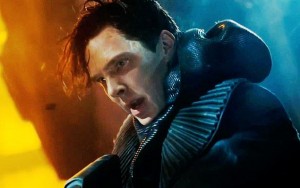 There’s being different and there’s being derivative. Don’t tell me most of the stuff in this movie would’ve been anywhere near as interesting to anyone if it hadn’t had counterparts in real Star Trek. Especially “John Harrison.” If I were making a movie and landed Benedict Cumberbatch as one of my leads, I’d give him more screen time than he got in this thing, and I’d certainly do him the courtesy of creating a new character for him. I thought the whole point of the 2009 movie was to give Abrams and his creative team a fresh start and a blank slate, but I guess I was wrong, because who is Cumberbatch playing? Khan.
There’s being different and there’s being derivative. Don’t tell me most of the stuff in this movie would’ve been anywhere near as interesting to anyone if it hadn’t had counterparts in real Star Trek. Especially “John Harrison.” If I were making a movie and landed Benedict Cumberbatch as one of my leads, I’d give him more screen time than he got in this thing, and I’d certainly do him the courtesy of creating a new character for him. I thought the whole point of the 2009 movie was to give Abrams and his creative team a fresh start and a blank slate, but I guess I was wrong, because who is Cumberbatch playing? Khan.
Ah, but Cumberbatch’s Khan isn’t the same character as Ricardo Montalban’s.
Well, they’re both non-Indian guys playing an Indian character. At least Montalban was dark-skinned. Casting Cumberbatch as a Sikh? Another win for racebending. But I interrupted you. You were saying?
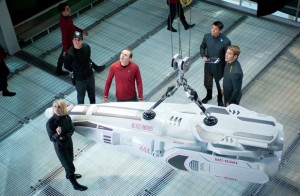 The original Khan was a character who spoke to the 1960s’ fears about genetic manipulation and scientists “playing God.” While those fears are still with us, the new Khan speaks more directly to our post-9/11 fears about terrorism, and what our response to it says about who we are as a society. I think Into Darkness’ best moments come when the characters debate how to pursue Khan. When Scotty resigned rather than blindly follow Admiral Marcus’ hyper-militaristic orders—“Is that all we are now? I thought we were explorers!”—I felt like applauding.
The original Khan was a character who spoke to the 1960s’ fears about genetic manipulation and scientists “playing God.” While those fears are still with us, the new Khan speaks more directly to our post-9/11 fears about terrorism, and what our response to it says about who we are as a society. I think Into Darkness’ best moments come when the characters debate how to pursue Khan. When Scotty resigned rather than blindly follow Admiral Marcus’ hyper-militaristic orders—“Is that all we are now? I thought we were explorers!”—I felt like applauding.
Well, sure, because, until that point, you were worried the filmmakers expected us to cheer on Captain James “Let’s-go-get-this-S.O.B.” Kirk. Admit it.
I do admit it—but I was proven wrong, wasn’t I? And let’s not forget that William Shatner’s Kirk didn’t always perfectly represent Starfleet’s high ideals, either. The first few acts of “Arena” mirror that early portion of Into Darkness pretty closely; if you’ll recall, Kirk is all hot to blow up the Gorn ship, and it’s left to Spock to ask some hard questions—just as Zachary Quinto’s Spock does in this movie. And Shatner’s Kirk is the hero who advocates letting Klingons die at the beginning of Star Trek VI. Both his and Pine’s Kirks, however, ultimately do the right thing. Abrams also told Jon Stewart that he’d done his Trek homework. I think it shows.
If by “homework” you mean watching Star Trek II enough to know which parts to shamelessly grab for his own flick.
What shameless grabbing? Poteet, I’m telling you: Into Darkness is a Star Trek “Elseworlds.” Watching Pine’s Kirk sacrifice himself to save the ship, as Nimoy’s Spock had done, was riveting. Both Pine and Quinto turned in solid performances. Kirk’s admission of fear especially moved me. Remember how Spock told him, in the 2009 film, that the purpose of the Kobayashi Maru test was to know fear? Kirk’s death scene managed to call back not only to Star Trek II, but also to Star Trek ’09.
Solid performances aren’t sterling ones. This movie talks a lot about what good friends Kirk and Spock are, but it doesn’t show us much of that.
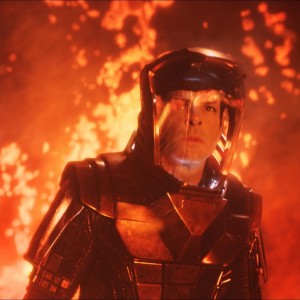 Are you kidding? Kirk breaks the Prime Directive to save Spock’s life, right in the first ten minutes!
Are you kidding? Kirk breaks the Prime Directive to save Spock’s life, right in the first ten minutes!
And for most of the rest of the show, they’re at odds with each other. I’ll grant that I like Pine as this alternate Kirk, and I like Quinto as this alternate Spock; but they simply haven’t had (and likely won’t ever have) time to develop the fully realized characters Shatner and Nimoy developed. Putting Kirk in that radiation chamber instead of Spock may have been clever, but it wasn’t authentic. All of that scene’s impact derived from its evocation of Star Trek II, not from Into Darkness’ own merits. Abrams’ Trek can’t claim it’s making a fresh start for the franchise as long as it continues to rely on what “old Trek” accomplished. It’s dishonest and disrespectful.
Poteet, do you want Abrams’ Trek to pay respect to “old Trek” (I think it does), or to you personally? Why do you have to be on the defensive about this, as though you’re the sole arbiter of what is good and faithful Star Trek? As I said, I don’t deny that Abrams’ Trek is different. But haven’t you learned anything in all these years as a Trekkie about accepting, appreciating, even celebrating differences? Does IDIC ring any bells? Abrams’ Trek is a good old-fashioned space opera. As much as Star Trek owes to literary science fiction from the likes of Asimov, Bradbury, and Clarke, it also owes something to pulpy, swashbuckling fare like Buck Rogers and Flash Gordon. Abrams’ Trek embraces that part of the franchise’s genetic makeup with gusto.
The same way Vulcans embrace technicalities. I loved that line, by the way.
Oh! So you admit you did like something about Into Darkness?
Several things, in fact. I liked Bruce Greenwood’s return as Admiral Pike (and am sad he won’t be back for any future installments—see, that’s another problem: why couldn’t they just pump Kahn’s super-blood into Pike’s corpse, and—)
Excuse me—you were highlighting some positives. Remember?
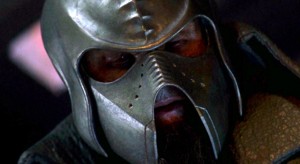 Oh, yeah. Well, I also liked the new Klingons, with their pirate-like pierced cranial ridges and their uber-ugly but ferocious birds-of-prey. And Michael Giacchino delivered another fantastic musical score; his theme for Khan is ominous and hauntingly beautiful. I also heartily approve of the opening sequence on Nabiru. From Kirk messing with the indigenous population’s religion to Spock’s logical near-sacrifice of himself for a “primitive” alien people, those opening minutes felt like a big-budget mini-episode of the original series.
Oh, yeah. Well, I also liked the new Klingons, with their pirate-like pierced cranial ridges and their uber-ugly but ferocious birds-of-prey. And Michael Giacchino delivered another fantastic musical score; his theme for Khan is ominous and hauntingly beautiful. I also heartily approve of the opening sequence on Nabiru. From Kirk messing with the indigenous population’s religion to Spock’s logical near-sacrifice of himself for a “primitive” alien people, those opening minutes felt like a big-budget mini-episode of the original series.
I agree.
Of course, a quick-acting cold fusion bomb is about as preposterous as red matter… or hiding the Enterprise under the sea; I half expected to see Sebastian the crab scuttling across the main deflector dish…
Oh, would you stop that?
What, you have no complaints about Into Darkness, Mr. “Please, J.J., Give Me More” Poteet?
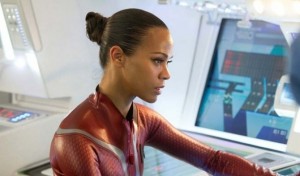 I never said that. I think the film does nothing to advance women in Star Trek, for instance. Zoe Saldana’s Uhura does get to exercise her communications expertise by speaking Klingon, but she spends most of the movie fretting about her relationship with Spock, to the point of initiating a heart-to-heart during a crucially important mission, something no Starfleet professional would do. And Alice Eve’s Carol Marcus could be any pretty blonde guest star of the week. At least Lindelof apologized for the needless underwear scene.
I never said that. I think the film does nothing to advance women in Star Trek, for instance. Zoe Saldana’s Uhura does get to exercise her communications expertise by speaking Klingon, but she spends most of the movie fretting about her relationship with Spock, to the point of initiating a heart-to-heart during a crucially important mission, something no Starfleet professional would do. And Alice Eve’s Carol Marcus could be any pretty blonde guest star of the week. At least Lindelof apologized for the needless underwear scene.
Hey, they’re just giving modern audiences want they want, right? Shouldn’t you be “celebrating that difference?”
Now you’re just being difficult.
No. Endorsing this movie with any integrity as a Star Trek fan—that’s being difficult.
Look, the bottom line is, they made an entertaining movie.
Right, and no one should expect anything more of a Star Trek production, because Gene Roddenberry was all about setting the bar low at “let’s just be entertaining.”
I don’t think we’re going to make any more progress right now. Maybe we can just agree to disagree, and talk again later?
I suppose. It’s not as though we won’t have opportunities, since—astonishingly—you’ve already pre-ordered the blasted thing from Amazon. At least you took my advice and have stayed away from the monthly IDW comic book series.
Quatloos are tight.
Anybody who only knows Abrams’ Trek won’t get that reference.
Well, maybe some of those folk will be sufficiently intrigued to give the original series a chance.
As (the real) Mister Spock is fond of saying, there are always possibilities.

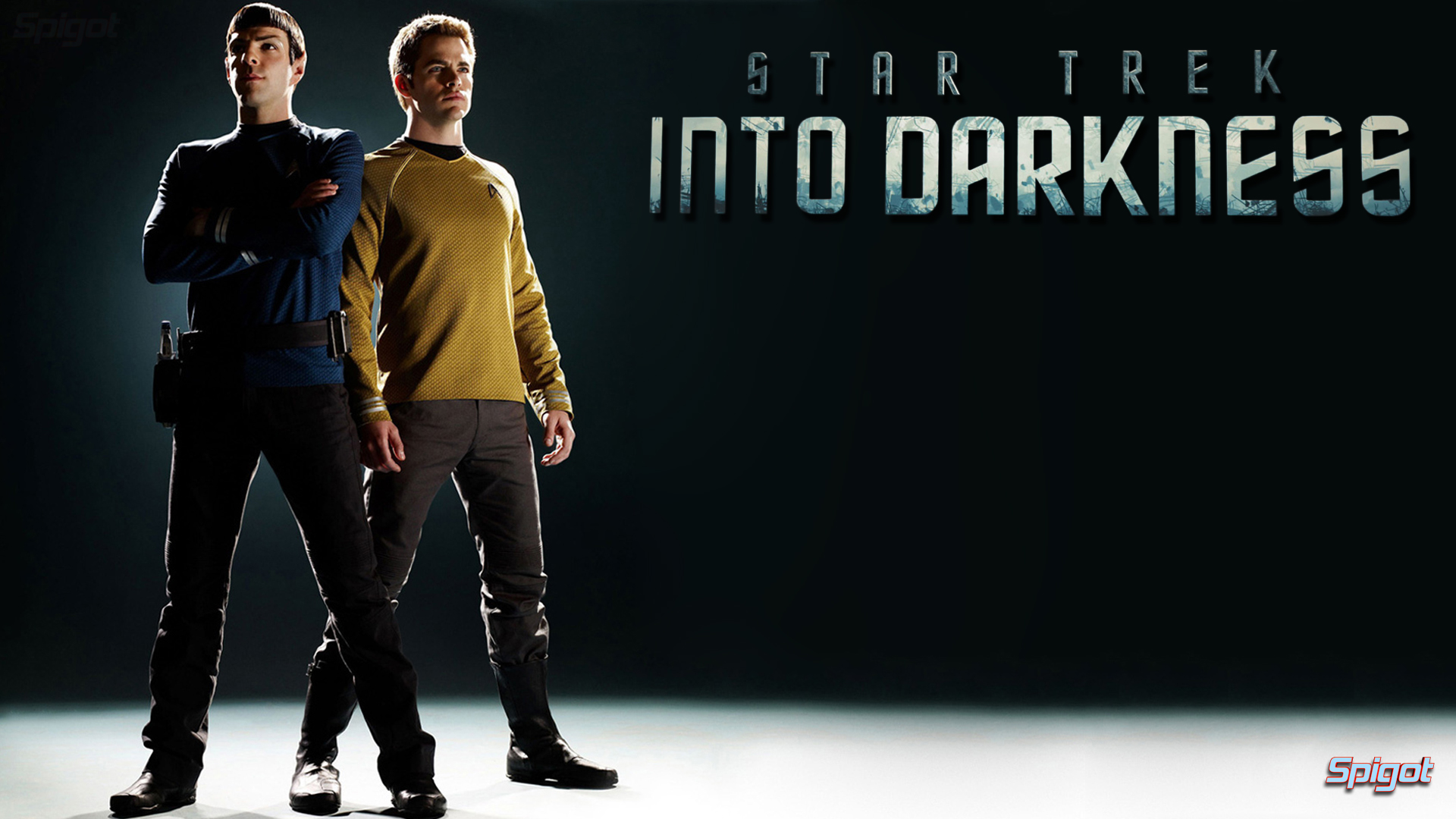
Defending the JJverse by appealing to IDIC is the most heart-warming, precious, and … logical thing I’ve read about the relationship between Trekkies and the new movies.
You nailed it Michael. I feel the same way, like I was caught in a transporter accident and there’s this version of me that loved the pure cinematic whirlwind of the movie and this other (slightly annoying) version that’s groaning about what Star Trek is really about.
Seeing that gif of John Cho revealing the racial homogenization of the franchise just makes me all flustered all over again! This is Star Trek – the show that DR MARTIN LUTHER KING’S DAUGHTERS WATCHED! I just, I can’t even anymore. I mean, maybe we trade off having a real Russian play Chekov for having a white guy replace Montalban…(who, by the way shouldn’t have changed races as a result of Nero’s time-stream-tampering.)
Yeah, I thought the Cho gif was pretty convicting. I really should devote a whole post to that subject sometime, that and the film’s marginalization of its female characters. I mean, I guess Carol Marcus got to defuse the torpedo, but, still – she was a pretty light addition, and mostly eye candy at that. I guess she has to hang around and get pregnant with David in the third film, huh?
The struggle for IDIC goes on… Thanks for reading and commenting!
WoK Carol vs ID Carol
One is a rounded character, valued for her intellect, her struggle to raise her son, her regret over a long-dormant romance, her courage to right thing even when her bosses and a super-powered maniac are trying to force her to do the wrong thing.
The other changed her clothes in front of Captain Kirk and squealed, “Turn air-round!”
Granted, Star Trek’s always had a sexy side, and often at the expense of women. But the progress made that culminated in Captain Janeway being the hero and main character of a TV series that ran for 7 years was hard-won and doesn’t deserve the wanton treatment it’s been given. Is JJ to blame? Only for these most recent transgressions. The folks over at Enterprise have a lot more to answer for regarding the respect of female characters.
No doubt about that critique of ENTERPRISE, Mickey, just one of many reasons I never really appreciated that series.
Alice Eve shares a character name and nothing more with Bibi Besch, so you don’t have to convince me!
On racebending: one of the hosts at Trek FM makes an intriguing suggestion regarding Cumberbatch’s race in their review of the film (http://trek.fm/the-ready-room/the-ready-room-97-bones-playing-with-a-tribble.html?utm_source=feedly) – If Khan had been cast as a dark-skinned man, would we all be complaining that it was playing into stereotypes about terrorism? Hm. Food for thought.
At any rate, I still think he was criminally underused.
I find this hilarious. Especially the parts about Gene not wanting to entertain as much as he wanted to make this epic large franchise vision with a purpose and a meaning. From what I have read, he was just happy to get the original on the air. Sure by Next Gen he had a different take on what he wanted to display. But he wasn’t this great missionary type character with a huge vision.
And while we are tossing around Star Wars, I love the way George has changed his tune as well. The first movie was an idea that he wanted to show that he could make a good movie and the concepts that he had as a visionary special effects person would work. If you remember interviews way back in the late 70s and early 80s he was shocked by the appeal and called it a little project. Today he speaks as if God came down to him in 1970 and laid out this great mythological and spiritual epic meant to change and unite the world forever. That was never what his original idea was. But somehow, he now believes his own press.
I mention this because I think Gene was the same way. He didn’t have great overarching mythos in mind when he created the original. But over time, he believed his own press as well and that is why he went on to talk about this great vision he had. Sorry I don’t buy that just like I don’t buy George’s claims of late.
That said, I am a HUGE fan of both series. I can’t wait to see Into Darkness because I have two broken ankles and not able to get out yet to see it. I am sure that I will love it. Will it be perfect? Nope. Will it make all the fans happy? Nope. But I will love it and look forward to both the next Trek and the new JJ Star Wars.
BTW, it is nice to know that I am not the only one that has arguments with himself 🙂
Hey Patrick! Thanks for reading, and taking the time to comment (especially not having seen the film yet – no fear of spoilers, eh? Brave man!)
I’ve got no illusions that Roddenberry had commercial interests. Of course, if he were purely interested in spreading a vision of humanity, he’d have done it regardless of profit or loss. Sure, he was happy to get the show on the air. That said, I do think, even pre-TNG, he did what he could to make his entertainment meaningful. Fighting to keep the character of Spock after the first pilot, for example. By his own admission, he made necessary compromises, but I think TOS isjust as much a “message show” as TNG (and, in some ways, TOS succeeds more at being one precisely because limitations and constraints breed creativity).
Enjoy the movie when you see it – it really is a lot of fun – and chime in again once you have.
I’m looking forward to seeing what JJ does with Ep VII, too!
This was an amazing analysis, Mike! Way to go on this! I enjoyed every second of it.
Thanks, Matt! It was fun to write.
An entertaining article.
Ha! This was well done. Sorry I got to it so late!! I’m with you fellas. I liked it a lot, but it definitely had some problems.
Better late than never! Glad you liked the movie, as well as my review – thanks for chiming in! What were some of your issues with the film?
Posted on Behalf of Allan Reini:
Michael, outstanding review.
Regarding “shamelessly grabbing the best parts of Wrath of Kahn” for this flick, I remember being very impressed, in 2009, with Abrams’ pulling off the seemingly impossible feat of granting himself permission to go wherever he wanted with the franchise without necessarily angering or alienating the show’s die-hard, traditional fan base. (like me) That being said, Into Darkness’ callbacks to WoK reshaped my opinion, for the better. Happily, there is now an element of BSG’s “All this has happened before. It will happen again,” infused into the Trek universe. Watching Kirk and Spock, juxtaposed, but still destined to play out that particular, iconic scene, struck me as a Doctorian “fixed point in time”—a moment that can be nuanced, but never avoided all together.
I’m just foolish enough to believe that this ties into our struggle to understand predestination vs. free will. I love to imagine that, regardless of our opportunities to take different paths in life, and make choices—both good and bad—there are certain mileposts that God already knows we will hit. We can plot, plan, scheme, and maneuver, but ultimately, we will end up at these appointments and it is our faith in Christ that then determines how we will respond to these pre-scripted moments. Kirk and Spock had to be there, one in a radiation-flooded compartment, the other watching helplessly from beyond a transparent barrier. They had to face it—it was predestined. The only variable was their response. I look forward to discovering more of these fixed points in time in the rebooted Trek universe, but more importantly, in this adventure of real life that we all share.
Sincerely, Allan Reini
Allan, thanks for the very thoughtful comment. I must confess, I am feeling less charitable toward “Into Darkness” as time wears on, however; and I fundamentally but respectfully disagree with you that the BSG “before/again” trope has any place in the Star Trek universe. In BSG, the cyclical nature of time is very fitting. It’s a quasi-mystical, mysterious way of making sense (sorta) out of the world. Trek, however, has always been devoted to figuring things out with a basis in observable reality. Knowing the truth, even when the truth is unpleasant. Refusing to accept that anyone or anything shapes our destiny or guides “the human adventure” but human beings and humanity themselves.
Now, as a Christian, I believe there is more to life than that; but I also don’t accept the cyclical nature of life as posited by BSG. For Abrams Trek to try and inject some kind of cyclical “determinism” (not your word, I know, but my take on it), even for “good” stuff — e.g., Kirk and Spock *must* be friends; Kirk *must* command the Enterprise — is a basic misunderstanding of what Trek is all about. I’m not sure I’d plead IDIC on its behalf so strongly as I did when I wrote my review. Yes, the great stories (and franchises) are to some degree endlessly malleable, and many different ways of telling the same story can be done… but, at some point, if a retelling sacrifices what makes the story the story, is it the story any more? (This is analagous, of course, to how the church proclaims the Gospel: it is capable of being told and proclaimed in many ways, but some are more faithful than others, and some are flat-out out of bounds.)
Your point about balancing predestination with free will is interesting and bears thinking about. Kevin C. Neece, over at “The Undiscovered Country Project,” argues much the same thing about the 2009 Abrams film (don’t know his take on STID yet). In the life of faith, I agree: it is a mystery how these two things fit together, but we need them both, and they are both true (although I suppose, as a Reformed Christian, I would ultimately argue that God’s decision for us precedes and takes precedence over our decision for God, however important our free human response is).
In Star Trek, however, I see no room for any talk of things being predestined, or “meant to happen.” Usually, whenever someone starts talking that way in Trek – super-aliens, rogue Starfleet folks, whoever — they get shot down (metaphorically, if not always literally!).
The inclusion of Nimoy Spock in STID shows that the filmmakers themselves realize the contradiction they have created and are either unable or unwilling to take it seriously. If they had wanted to craft a scene in which Quinto Spock contacts Nimoy Spock, *and* if they had wanted that scene to remain faithful to Trek, they would have had Nimoy Spock deliver his speech about “not telling you the future, your journey is yours alone” — and then have him terminate the transmission. It is an insult to the character Nimoy has created over the last five decades, and it’s an insult to Trek.
Flibbedy-floo. 🙂 I know I sound like the Grumpy Old Fan here who needs to get a life, but my opinion of STID has been revised dramatically downward over the last two months, and this is the crux of the matter, this question of freedom versus determinism, and since you brought it up….!
But I do thank you for doing so, and for doing so very eloquently! Thanks again for the comment (and your persistence in getting it onto the site, via Matt — Thanks, Matt!)